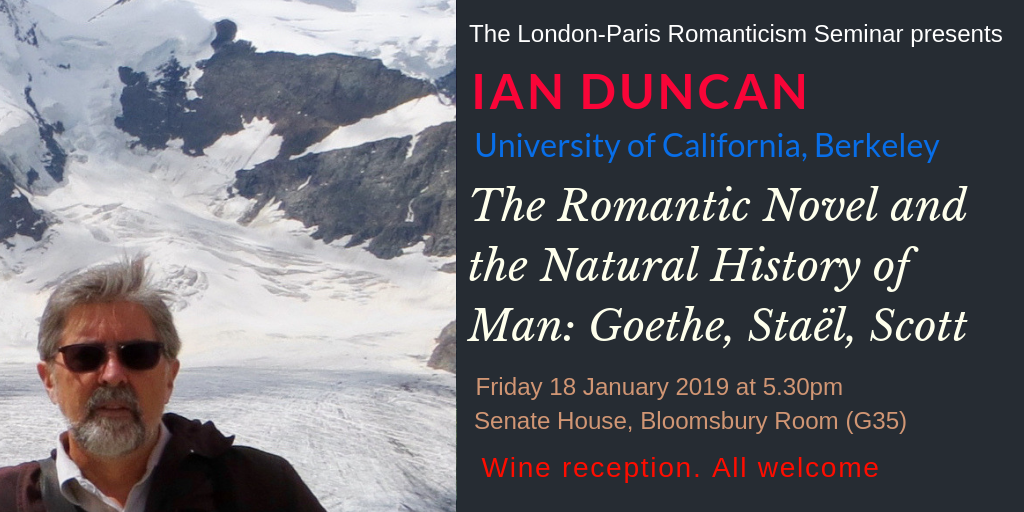
The next meeting of the London-Paris Romanticism Seminar will be held on Friday 18 January in the Bloomsbury Room (G35) at Senate House, University of London, starting at 5.30. Our distinguished guest speaker is Ian Duncan, Professor of English at the University of California, Berkeley, who will present a paper entitled The Romantic Novel and the Natural History of Man: Goethe, Staël, Scott. This will be followed by a discussion and a wine reception. The event is free and open to everyone, including postgraduates and members of the public. No booking is required.
Ian Duncan studied at King’s College, Cambridge and Yale University and taught for several years in the Yale English department before being appointed Barbara and Carlisle Moore Distinguished Professor of English at the University of Oregon in 1995. He moved to Berkeley in 2001 and was appointed to the Florence Green Bixby Chair in English in 2011. He is the author of Modern Romance and Transformations of the Novel (1992), Scott’s Shadow: The Novel in Romantic Edinburgh (2007), and a new book, Human Forms: The Novel in the Age of Evolution, forthcoming from Princeton University Press in 2019. He is currently writing a short book on Scotland and Romanticism. He is a Vice-President of the Association for Scottish Literary Studies, a Corresponding Fellow of the Royal Society of Edinburgh, a member of the editorial board of Representations, a General Editor of the Collected Works of James Hogg, and co-editor of a new book series, Edinburgh Critical Studies in Romanticism. He has held visiting positions at the universities of British Columbia and Konstanz, Boğaziçi University, LMU Munich, and Princeton University.
Regarding the topic of his talk, Ian writes:
‘Late Enlightenment philosophical anthropology, the natural history of man, provided a scientific matrix for the “new genres or sub-genres characteristic of realism” (Fredric Jameson) born in the “novelistic revolution” (Franco Moretti) of European Romanticism. The German Bildungsroman and its close kin, the Scottish historical novel, realized the open, plastic, developmental conception of form as perpetual becoming with which J.G. Herder and others specified human nature (and saved human exceptionalism). My paper will revisit the case of Goethe’s Wilhelm Meister’s Apprenticeship, the critically vexed prototype of the Bildungsroman; consider the solution – national history – with which Scott’s “classical form of the historical novel” sought to stabilize the potentially infinite drift of historical variation under the sign of a universal nature; and turn, lastly, to Germaine de Staël’s critique of the gendered protocols of Bildung and national history in her “philosophical romance” Corinne.’